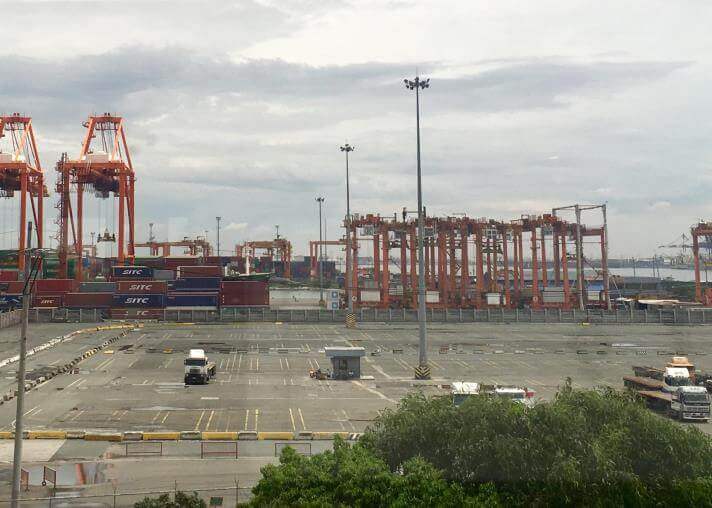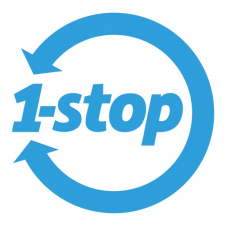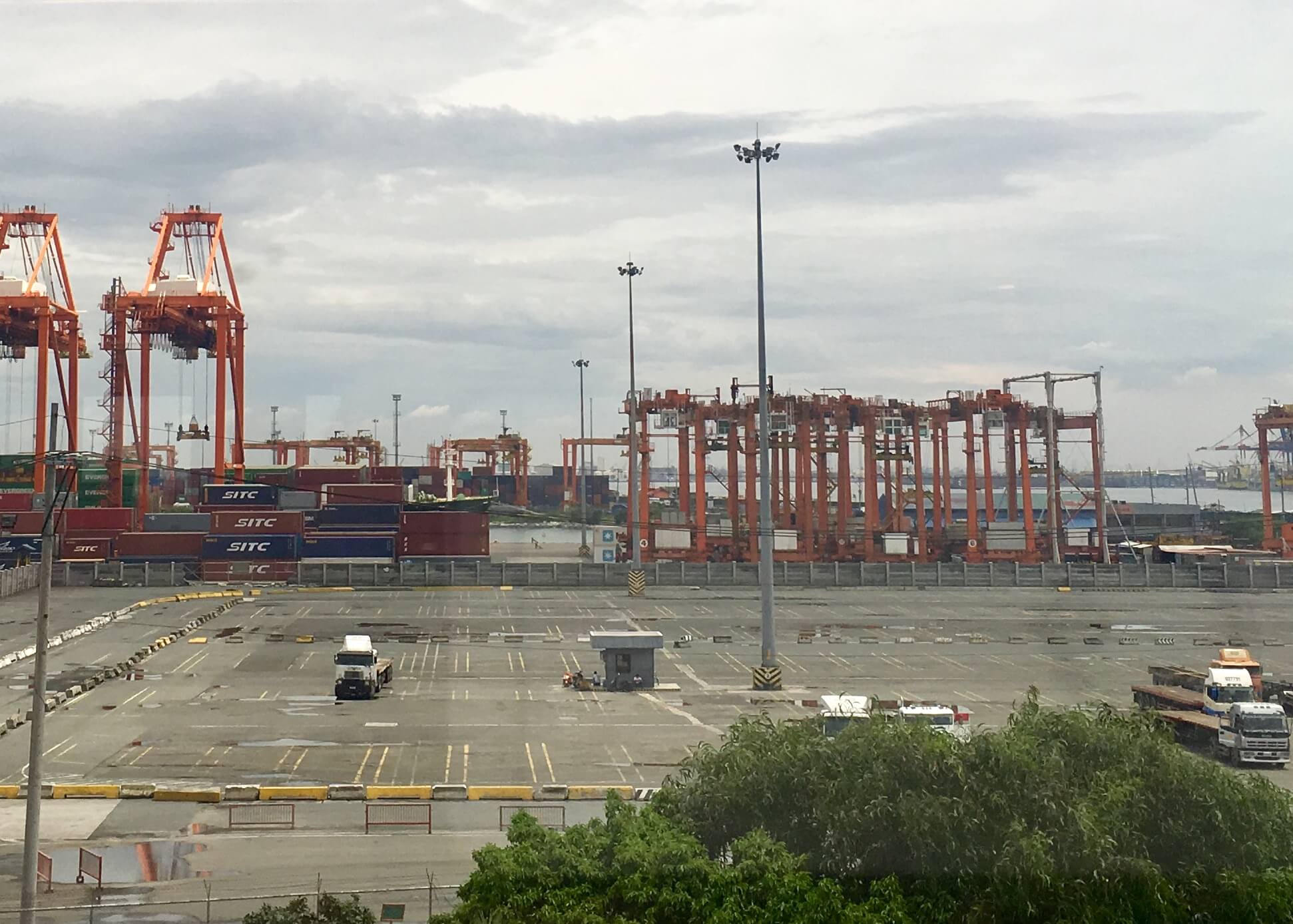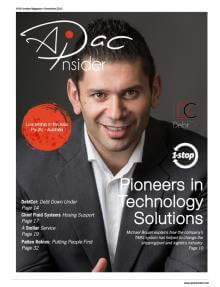
The Port to Success
Established in 2002, 1-Stop Connections are the world leaders in improving and automating business processes and delivery technology solutions, that connect and maximise the utilisation of assets in the port community. Their services reach the wider sea-freight community and their customers include shipping lines, freight forwarders, customs brokers, 3PL’s trucking companies, rail operators, importers and exporters. 1-Stop helps stakeholders to move import and export cargo more efficiently and is the provider of choice in ports across the globe.
As an innovative firm, 1-Stop is determined to listen and look for ways to improve customer experiences. Michael Bouari, CEO of 1-Stop Connections gives us an interesting insight into the firm’s business strategy and their creative and dynamic vision for the future of their products.
“There is a distinct focus on improving productivity for the movement of freight. We have world leading products and are pushing them into overseas markets, whilst also extending our solution offering further down the supply chain, to make the import and export process simple and seamless. We are commercially proactive and work hard to create sustainable solutions.”
Michael describes what approach 1-Stop takes when working with clients, whilst also sharing how the company’s key principles improve the client experience.
“We have solutions that are used by international companies such as DP World, DHL and Maersk to government authorities and trucking companies, freight forwarders, importers, exporters etc. Our approach is to understand the client’s business, their pain points, business challenges, inefficiencies, then assist them with solutions that address those challenges. Also, all of our solutions generally have business impact on efficiency which means it is not just a solution that one business benefits from, but rather that business and its many customers and suppliers!
“Our people are our asset and the team is highly engaged in helping us achieve our goals and implement our strategy. We aim to keep the user experience simple for clients by connecting business and systems. Ultimately, we want businesses to use one system or have one user experience for carrying out all their work. Our goal is always system to system solutions, unless of course, you do not have a system and then you can use our system end to end. We collaborate with our customers, the community and our employees to develop solutions that are practical. Another key principle that aids the client experience, is that we pride ourselves on being inefficiency hunters and problem solvers. We hunt inefficient processes and look to improve them, with productivity solutions. By finding new ways to run clients’ day to day business, we reduce running costs and increase revenue.”
Along with his knowledge and experience, Michael highlights some key areas which he believes have made him and his company award winning.
“Firstly, by having an engaged team, we can have a clear vision which the team buys into. We consistently engage with one another on what we are doing each day, which brings us closer to that vision. Our continuous improvement and our ability to be solution focused and adaptable is another area which makes us award winning. Our attitude and culture of wanting to be better every day as an individual and as a company translates into happy customers and growth within our people. When navigating a strategy, idea or initiative into unchartered waters, I have a good ability to break down the task through my natural intuition. This makes the solution manageable for the team and provides assistance as required. Finally, having a positive attitude every day will rub off onto the rest of the team.”
1-Stop Connections listens to their customers, takes swift action that benefits them and innovates which has helped the company become a trusted leader and service provider that our customers rely on. The company is continually improving and innovating what they do and constantly work with customers to ensure their products services their needs. Despite success, there are always challenges for any business to deal with. Michael explains that the main stumbling block across the APAC region is the change in technology.
“Embracing technology in the freight and logistics industries across Asia has been a challenge as technology in that industry has its challenges. It is a fragmented industry which is accustomed to using paper and cash. It is a cultural change management exercise that once the solutions are introduced, they eventually become heavily dependent on.” In a competitive environment, Michael describes another challenge that 1-Stop continues to face. “Providing a great customer experience and having value added solutions has kept the competition away. The next phase of that is continuous improvement and innovation.”
The APAC region has benefitted from a new system which 1-Stop Connections has implemented. The Terminal Appointment Booking System (TABS) was installed in September 2015. The system officially went into soft launch in October 2015 at both the international port terminals in Manila, Manila International Container Terminal (MICT) and Asian Terminals Inc. (ATI). During the soft launch, there were 1,540 registered companies to use TABS, 93% were active and 50% participated. A soft launch was used by the industry so they had time to get used to the system and to modify processes to get the most from it. Michael explains how the process for implementing the system was relatively easy.
“From February 2016, the full implementation of TABS and its associated rules were officially employed and endorsed by the 17 mayors of Manila which meant that if you had a TABS booking, you had a truck ban exemption through metro Manila. This was a huge win for the import and export community which allowed the industry to be productive 24 hours of the day. As of September 2016, there are 2,400 registered companies using TABS.
“The system we implemented was ‘out of the box’ with multiple standard interfaces. Our system can speak to the Philippines port community using web, XML, flat file, FTP and web services etc. Due to the immediate challenges, they needed something quickly, so we were able to install our ‘out of the box’ solution. This showed flexibility to meet the port’s needs, with the view that they can embrace the change management over time. It was a very smooth implementation.
“There are over 240 customisable settings in the standard product. We have installed only four out of the 15 modules available in the TABS component of the PCS. The other modules will be implemented as the market matures and as the business protocols change.
“Soon after the implementation, they required a means for handling online payments which is another component of our PCS. We had a payment gateway already so we were able to enhance it to meet the needs of the Philippines port community in a short time frame – two months to be exact.”
Before TABS, there was no system in place. To import/ export cargo, someone had to go to the terminals to pay, then to the shipping line to pay. After this, they had to get a manual gate pass and find a freight forwarder that was available during the time the manual gate pass was valid for. The drivers then had to join the queue with other trucks to pick up their container. While some of these steps are still in place, there is now no need to get a manual gate pass. Companies simply book their spot in the TABS system, arrange payment via the virtual payment system and get their driver to pick up the cargo during the booking time.
Import dwell times were eight to 16 days on the wharf, which was reduced to four days after the new system was implemented. In the first month, volumes were up 18% with the same equipment and labour. In June 2016, volumes increased to 44%.
Other stats which highlight the difference between pre and post TABS include: –
- Truck dwell time was 130 mins with 48% served within two hours, now the dwell time is 100 mins with 72% served within two hours
- Number of trucks in was 2,609, now 2,483
- Number of containers served was 2,900, now the number is 3,191 Trucks trips was one per 24 hours, now two or more per 24 hours
- The load factor was one per trip, now it’s one each way with 60% of trucks carrying two.
Michael explains that this was the first contract that 1-Stop Connections had in the Philippines, but this is just the beginning of their journey in the implementation of the PCS in the Philippines, with the view that there will be more components of their PCS to be rolled out over the coming years. There is more to do at MICT and ATI.
“As only four of the 15 modules for one component (TABS) have been installed, we are working with the port community to implement more of the 1-Stop PCS components and stream line the manual to automated business processes as the market matures and realises the benefits our PCS brings. There are always ways to improve our systems and the way things are done. We are an innovative and collaborative company that is always looking at new technology and improving the port communities around the world.”
By studying the market and technology trends, 1-Stop applies proven models from other industries and adapts them to their own.
“Of course, we have a really smart team that is always looking for new ways to solve inefficient processes though innovative solutions that we build, implement and refine. In the industry, we monitor the shipping and logistics industries and can see the industry suffering. That makes our purpose even more important as we assist these business in reducing costs and increasing revenue. Also, we monitor technology trends such as Big Data, cloud, IoT, automation and can see the change to a decentralised approach for managing information and running optimisation tools across many data sources to yield dynamic suggestions to the end user.”
“Our main goal is to make life simple and productive for any stakeholder in the import and export process. I can easily say that this industry has been left behind in comparison to other industries, such as banking who have embraced technology from the outset. Whilst we have made significant inroads in our current markets, we understand that many ports around the world are lagging behind and are crying out for solutions such as ours. Our solutions will allow you to do more with less!”
See more about Manila’s story here: https://www.1-stop.biz/news/manila-philippines-mict-and-ati/
Company: 1-Stop Connections
Name: Michael Bouari
Email: [email protected]
Web Address: www.1-stop.com
Telephone: 1300 881 055 (Australia), +61 2 9588 8900 (International)






























